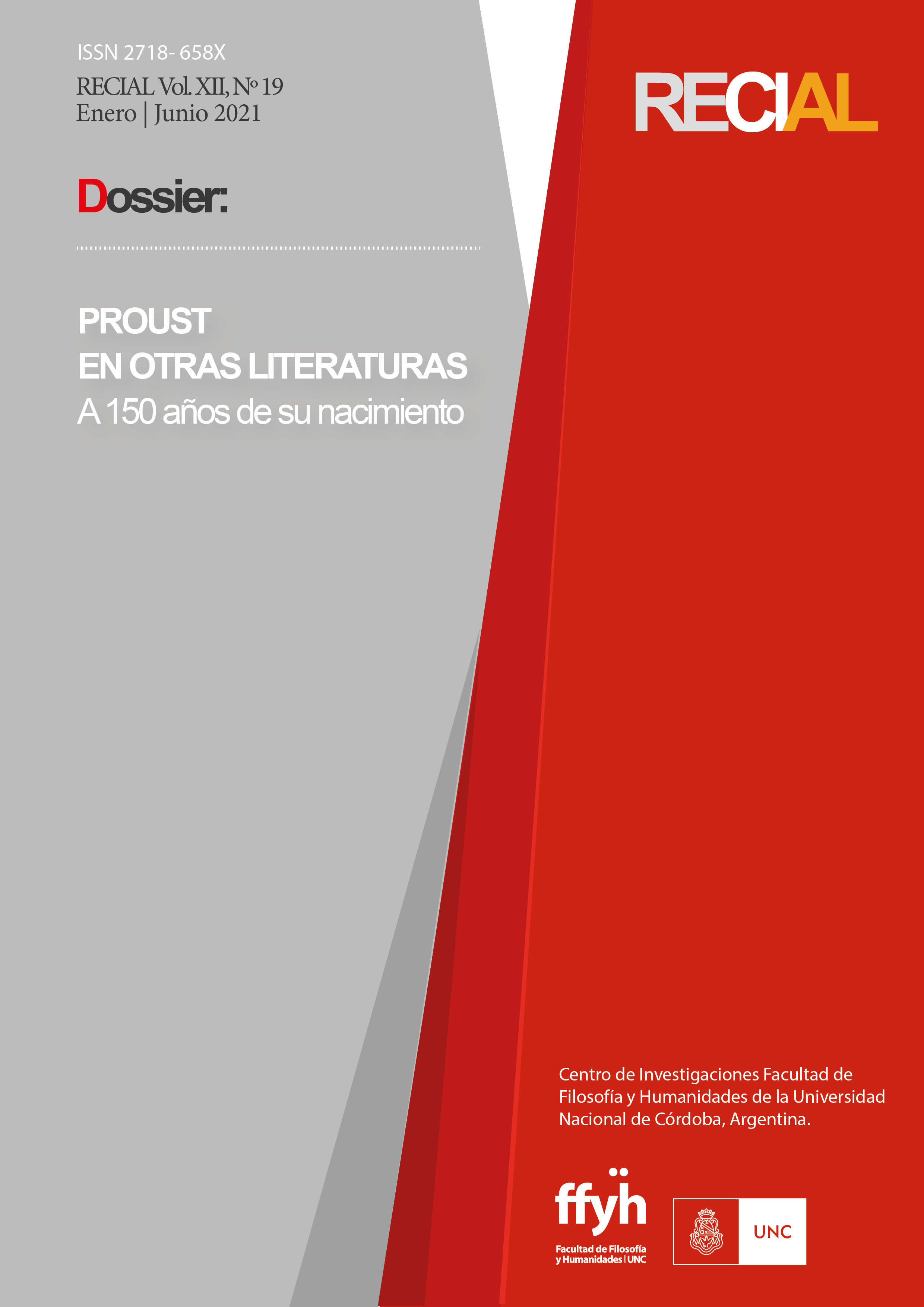Along the way of words: time, memory and writings of the self in Marcel Proust and Natalia Ginzburg
DOI:
https://doi.org/10.53971/2718.658x.v12.n19.33835Keywords:
memory, lexicon, family, spaces, autobiographyAbstract
There is an undeniable relationship between Marcel Proust and Natalia Ginzburg. Their respective works, À la recherche du temps perdu and Lessico famigliare, engage in a deep and productive intertextual dialogue. This relationship has already been mentioned in numerous critical studies in Italian language, but in Spanish there are few that explore this dialogue between the two authors, their poetics and their texts. The purpose of this work is, then, to initiate a comparative study on certain aspects of both works, which allows to delimit and specify some of the characteristics that link them. Our work starts with a brief but necessary contextualization on the translation and reception of Proust in Italy and then focuses on the analysis of certain aspects which are present in both works, such as memory and lexicon, the words of the tribe and others, the places of memory and the autofigurations of the writers as children.
Considering that our subject of study involves memory and the writings of the self, the theoretical contributions of Paul Ricoeur in relation to memory, and those of Paul de Man and Mikhail Bakhtin regarding the status of autobiographical writing, have guided us in the analysis of both texts.
References
Abes, G. (2020). No caminho de proust: o clássico e suas traduções como acontecimento. Revista de Letras, 1(39). Recuperado dehttp://www.periodicos.ufc.br/revletras/article/view/61409
Abignente, E. (2017). Memorie di famiglia. Un genere ibrido del romanzo contemporáneo. En ENTHYMEMA, (20), 6-17. Recuperado de https://doi.org/10.13130/2037-2426/9408
Adorno, T. (2003). Notas sobre literatura. Madrid: Akal. Recuperado de https://ia801300.us.archive.org/20/items/246431088AdornoNotasSobreLiteratura/246431088-Adorno-Notas-Sobre-Literatura.pdf
Arfuch, L. (2014). (Auto)biografía, memoria e historia. Clepsida. Revista Interdisciplinaria de Estudios sobre Memoria, (1), 68-81.
Benjamin, W. (1929). Hacia la imagen de Proust. Recuperado de http://www.agrupacionmayo.com.ar
Bertini, M. (2014). Attraverso Natalia: un percorso proustiano degli anni sessanta. En A. Dolfi (Ed.), Non dimenticarsi de Proust: declinazioni di un mito nella cultura moderna.
Deleuze, G. (1995). Proust y los signos. Barcelona: Anagrama.
Fernández Cardo, J. M. y González, F. (2006). Literatura Francesa del siglo XX. Madrid: Síntesis.
Ferroni, G. (2016). Presenze proustiane in scrittrici del Novecento italiano. En F. Tomassini, I. Antici y M. Piazza (Eds.), Cent'anni di Proust. Echi e corrispondenze nel Novecento italiano. Recuperado de https://www.academia.edu/27241736/Giulio_Ferroni_Presenze_proustiane_in_scrittrici_del_Novecento_italiano_in_Ilena_Antici_Marco_Piazza_Francesca_Tomassini_a_cura_di_Cent_anni_di_Proust._Echi_e_corrispondenze_nel_Novecento_italiano_RomaTre-Press_Roma_2016_pp.19-32
Garboli, C. (1999). “Introduzione” [1963] a Lessico Famigliare. Torino: Einaudi.
Ginzburg, N. (1999). Lessico famigliare. Torino: Einaudi.
Ginzburg, N. (2017a). Cómo he traducido Proust. Zibaldone. Estudios Italianos, V(2), 140-144. Recuperado de https://dialnet.unirioja.es/descarga/articulo/6046352.pdf
Ginzburg, N. (2017b). Léxico familiar. Buenos Aires: Lumen.
Guzzo, V. (2018). Sobre cuatro habitaciones proustianas. En A. Melamed (Coord.), Actas de las II Jornadas Marcel Proust. Recuperado de https://libros.fahce.unlp.edu.ar/index.php/libros/catalog/book/121
Horia, V. (1989). Introducción a la literatura del Siglo XX. Santiago de Chile: Andrés Bello.
Mattarucco, G. (2014). Natalia Ginzburg Traduttrice. KWARTALNIK NEOFILOLOGICZNY, LXI. Recuperado de https://www.academia.edu/35541895/Natalia_Ginzburg_traduttrice
Miguel y Canuto, J. C. (2011). El camino que lleva a Natalia Ginzburg: el Lessico famigliare desde dentro. EPOS, XXVII, 249-264.
Mondello, E. (2017). La casa e la città. L’interno e l’esterno. Note sulla poetica dello spazio di Natalia Ginzburg. Bollettino di italianistica. Rivista di critica, storia letteraria, filologia e linguistica, XIV(2).
Pettinotto, J.-P. (2013). Raconter une crise: la mémoire et la vie familiale dans les ouvres de Natalia Ginzburg y Marguerite Duras (Tesis doctoral). Université Lumière Lyon 2, Francia.
Piazza, M. (2016). Gli anni Trenta e le prime letture filosofiche italiane di Proust. En I. Antici, M. Piazza y F. Tomassini (Eds.), Cent’anni di Proust. Echi e corrispondenze nel Novecento italiano. Recuperado de https://www.academia.edu/26467156/Gli_anni_Trenta_e_le_prime_letture_filosofiche_italiane_di_Proust
Proust, M. (s. f.). À la recherche du temps perdu. La Bibliothèque électronique du Québec. Recuperado de https://beq.ebooksgratuits.com/
Proust, M. (1982). A la búsqueda del tiempo perdido. Buenos Aires: Hyspamérica.
Ricoeur, P. (2014). La memoria, la historia, el olvido. Buenos Aires: Fondo de Cultura Económica.
Scarpa, D. (2020). Falsi amici. Tradurre, (19). Recuperado de https://rivistatradurre.it/falsi-amici/
Downloads
Published
Issue
Section
License

This work is licensed under a Creative Commons Attribution-NonCommercial-ShareAlike 4.0 International License.
Aquellos/as autores/as que tengan publicaciones en esta revista, aceptan los términos siguientes:
- Los/as autores/as conservarán sus derechos de autor y garantizarán a la revista el derecho de primera publicación de su obra, el cuál estará simultáneamente sujeto a la Licencia de reconocimiento de Creative Commons que permite a terceros compartir la obra siempre que se indique su autor y su primera publicación esta revista.
- Los/as autores/as podrán adoptar otros acuerdos de licencia no exclusiva de distribución de la versión de la obra publicada (p. ej.: depositarla en un archivo telemático institucional o publicarla en un volumen monográfico) siempre que se indique la publicación inicial en esta revista.
- Se permite y recomienda a los/as autores/as difundir su obra a través de Internet (p. ej.: en archivos telemáticos institucionales o en su página web), luego de su publicación en la revista. (Véase El efecto del acceso abierto).





